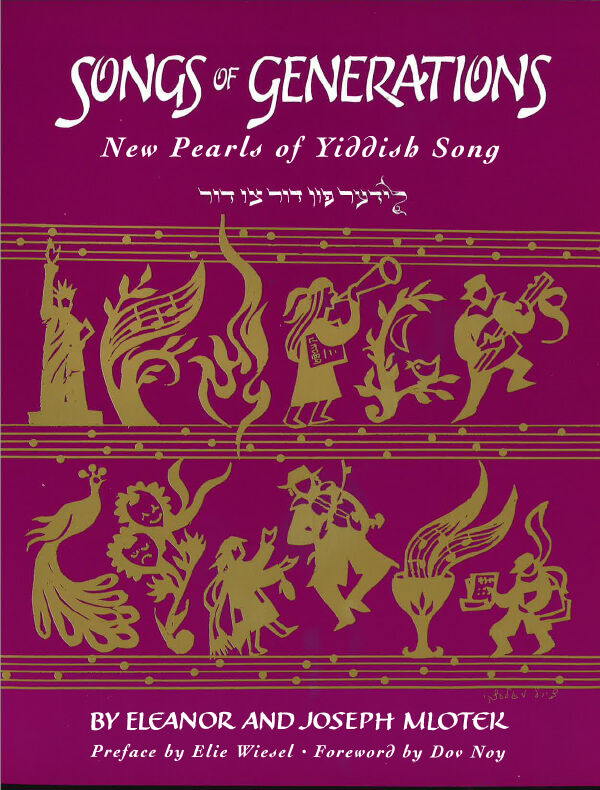Humorous interpretation of the sayings of the sages was collected by compiler in Poland from Jacob Pat; Yiddish writer and cultural leader, who sang it at a summer colony of the SKIF (Jewish Socialist Children’s Association) prior to World War II. A different melody was published by Schack and Cohen in 1924. The refrain of the vocables “ay-ay-ay” is sung by the audience each time with increasing fervor until the humorous climax (or anti-climax) is reached. The words “Tonu rabonen” which introduce many passages of the Talmud enhance the humor, combining the serious with the mundane.

“Tonu rabonen,”
Our great teachers taught:
What would be, what would be,
what would be,
if, from all the peasants
in the whole world,
there became, there became, there became
one tremendous peasant?
— Ay, would that be a peasant!
Ay-ay-ay… !
“Tonu rabonen,”
Our great teachers taught further:
What would be, what would be,
what would be,
if, from all the trees
in the whole world,
there became, there became, there became
one tremendous tree?
— Ay, would that be a tree!
Ay-ay-ay… !
“Tonu rabonen,”
Our great teachers taught still further:
What would be, what would be,
what would be,
if, from all the axes
in the whole world,
there became, there became, there became
one tremendous axe?
— Ay, would that be an axe!
Ay-ay-ay… !
“Tonu rabonen,”
Our great teachers taught even further:
What would be, what would be,
what would be,
if, from all the rivers
in the whole world,
there became, there became, there became
one tremendous body of water?
— Ay, would that be a river!
Ay-ay-ay… !
“Tonu rabonen,”
Our great teachers taught further and further until they taught:
What would be, what would be,
what would be,
if, this very peasant
took up this very axe
and with this very axe
gave a whack to this very tree
and this very tree
up and fell into this very water,
— Ay, that, would be some splash then!
Ay-ay-ay!
Tonu rabonen
Hobn undzere khakhomim gelernt:
Vos volt zayn, vos volt zayn,
Vos volt zayn,
Ven fun ale poyerim
In der gantsener velt,
Volt vern, volt vern, volt vern
Eyn groyser payer?
– Ay, volt dos a poyer geven!
Ay-ay-ay . . . !
Tonu rabonen
Hobn undzere khakhokhim vayter gelernt:
Vos volt zayn, VOS volt zayn,
Vos volt zayn,
Ven fun ale beymer
Fun der gantsener velt
Volt vern, volt vern, volt vern
Eyn groyser boym?
– Ay, volt dos a boym geven!
Ay-ay-ay . . . !
Tonu rabonen
Hobn ober undzere khakhomim nokh vayter gelernt:
Vos volt zayn, vos volt zayn,
vos volt zayn,
Ven fun ale hek
Fun der gantser velt,
Volt vern, volt vern, volt vern
Eyn groyse hak?
– Ay, volt dos a hak geven!
Ay-ay-ay . . . !
Tonu rabonen
Hobn ober undzere khakhomim nokh vayter gelernt:
Vos volt zayn, vos volt zayn, vos volt zayn,
Ven fun ale taykhn
Fun der gantser velt
Volt vern, volt vern, volt vern
Eyn groyser vaser?
– Ay, volt dos a taykh geven!
Ay-ay-ay . . . !
Tonu rabonen
Hobn ober undzere khakhomim alts vayter gelernt:
Vos volt zayn, vos volt zayn, vos volt zayn,
Ven der doziker poyer
Volt a nem geton di dozike hak,
Un mit der doziker hak
Volt er a hak geton in dozikn boym
Un der doziker boym
Volt a fal geton in dozikn vaser,
– Ay, volt es demolt a plyukhke geton!
Ay-ay-ay!
תּנו רבנן
האָבן אונדזערע חכמים געלערנט:
װאָס װאָלט זײַן, װאָס װאָלט זײַן,
װאָס װאָלט זײַן,
װען פֿון אַלע פּױערים
אין דער גאַנצענער װעלט,
װאָלט װערן, װאָלט װערן, װאָלט װערן
אײן גרױסער פּױער?
-אײַ, װאָלט דאָס אַ פּױער געװען!
אײַ-אײַ-אײַ. . .!
תַּנו רבנן
האָבן אונדזערע חכמים װײַטער געלערנט:
װאָס װאָלט זײַן, װאָס װאָלט זײַן,
װאָס װאָלט זײַן,
װען פֿון אַלע בײמער
פֿון דער גאַנצענער װעלט,
װאָלט װערן, װאָלט װערן, װאָלט װערן
אײן גרױסער בױם?
—אײַ, װאָלט דאָס אַַ בױם געװען!
אײַ-אײַ-אײַ. . .!
תּנו רבנן
האָבן אָבער אונדזערע חכמים נאָך װשטער געלערנט:
װאָס װאַלט זײַן, װאָס װאָלט זײַן,
װאָס װאָלט זײַן,
װען פֿון אַלע העק
פֿון דער גאַנצער װעלט,
װאָלט װערן, װאָלט װערן, װאָלט װערן
אײן גרױסע האַק?
-אײַ, װאָלט דאָס אַ האַק געװען!
אײַ-אײַ-אײַ. . .!
תּנו רבנן
האָבן אָבער אונדזערע חכמים נאָך װײַטער געלערנט:
װאָס װאָלט זײַן, װאָס װאָלט זײן, װאָס װאָלט זײַן,
װען פֿון אַלע טײַכן
פֿון דער גאַנצער װעלט,
װאָלט װערן, װאָלט װערן, װאָלט װערן
אײן גרױסער טײַך
-אײַ, װאָלט דאָס אַ טײַך געװען!
אײַ-אײַ-אײַ. . .!
תּנו רבנן
האָבּן אָבער אונדזערע חכמים אַלצ װטער געלערנט:
װאָס װאָלט זײַן, װאָס װאָלט זײַן, װאָס װאָלט זײַן,
װען דער דאָזיקער פּױער
װאָלט אַ נעם געטאָן די דאָזיקע האַק,
און מיט דער דאָזיקער האַק,
װאָלט ער אַ האָק געטאַן אין דאָזיקן בױם
און דער דאָזיקער בױם
װאָלט אַ פֿאַל געטאָן אין דאָזיקן װאַסער,
-אײַ, װאָלט עס דעמאָלט אַ פּליוכקע געטאָן!
אײַ-אײַ-אײַ!
Song Title: Tonu Rabonen

The Songs of Generations: New Pearls of Yiddish Song anthology comprises songs that were either never printed before or appeared in rare and inaccessible publications — sometimes in different versions and without proper sources. Most of the songs in this book were submitted by readers of Chana and Yosl’s column “Perl fun der yidisher poezye” (Pearls of Yiddish Poetry) in the Yiddish newspaper Der Forverts (The Forward), initiated in October, 1970. Over 25 years, thousands of songs were collected in correspondence and on cassettes from readers throughout the world, and they represent a veritable national Yiddish song archive. Chana Mlotek, in her introduction, writes, “In the course of years the inquiries, contributions and enthusiasm of these readers have kept our own interest unflagging and have reinforced our dedication to this effort. And in recent years our participants have also been augmented by new readers from the former Soviet Russia, who receive our newspaper there or from newly-arrived immigrants in this country and Israel.”